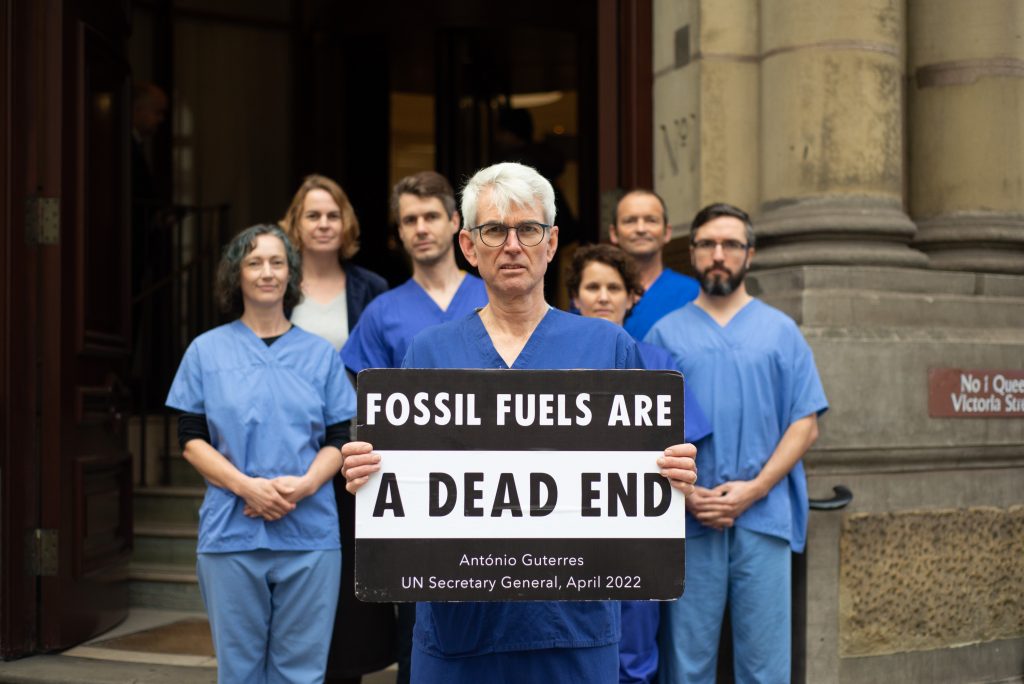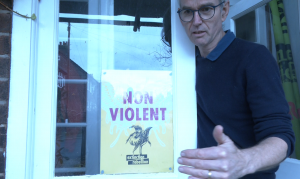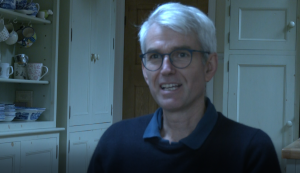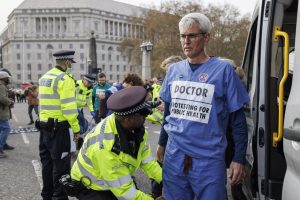
For most people, retirement means more time with the grandchildren and maybe an extra holiday every year. But one month after his retirement from Ordsall Health Surgery GP, Dr David McKelvey found himself in a London cell.
“You’re in a cell without any windows, and you’re lying there wondering “what are you doing?” It’s a time of self-reflection, but I have to say that I felt it was right to make that stand,” he said.
Upon approaching Dr McKelvey’s house in Withington, it quickly becomes clear his decision to retire after 17 years in Ordsall didn’t come for a want of rest and relaxation, or the promise of a yearly trip to Corfu. The sound of clattering echoes from the scaffolding-clad roof as his wife shouts for him to come down.
She said: “He’s putting cavity wall insulation in. We’re trying to cut our emissions.”
This is the first clue to why Dr McKelvey really retired. The second is the posters and banners that were pasted across his front door and windows. Each showed different slogans and messages from various ‘Extinction Rebellion’ protests, all with “DOCTORS FOR XR” along the bottom.

Dr McKelvey said: “I’ve been involved with Doctors for Extinction Rebellion for a number of years now… We feel climate change really is a health issue; it’s hitting the poorest people right now.”
It was with this group that Dr McKelvey travelled down to London on April 9, as part of the larger Extinction Rebellion protest against the Government’s position on funding fossil fuel companies, which have received £14.1 billion in subsidies since 2015 according to Paid to Pollute.
He said: “It’s effectively the industry that is causing the damage because of climate change… And billions of pounds of our money is funding it.”
Dr McKelvey has already seen the effects of climate change up close, and so is uniquely situated to understand the danger it brings. Before he was a GP in Ordsall, he worked as a Doctor in rural Tanzania.
He said: “When you work in a situation like that, you really become aware that it’s things outside the hospital that influence health. The housing, clean water supplies, food, mosquito nets. Those kinds of things… Climate change is already affecting all of that in Africa and the Middle East, and it’s starting to affect us here.”
He pointed out the drop in food production, made worse by the war in Ukraine, as well as the heatwave that gripped Europe during the summer.
“The people who are insulated by lots of money are fine, but the people I worked with in inner city Salford – They’re going to feel this the most. Food shortages and underfunded health services will hit them the hardest when these crises develop.”
Over the past 17 years, Dr McKelvey has played an active part in reducing Salford’s carbon emissions through talks and his role on the Clinical Commissioning Group. Even after retiring, he still works one day advising GP’s on how to reduce their environmental impact.
But after COP26, Dr McKelvey felt he had to do more.
“I resigned from the practice at the end of March, and I did it in order to do more protests.”
And so, less than two weeks after his retirement, Dr. McKelvey found himself on Lambeth Bridge along with hundreds of other protesters during the second day of the protests.
“Me and my colleagues were all dressed in scrubs, to show that we are doctors and nurses. Eventually the rest of the group decided to leave. But we, as health professionals, we really thought we should use this opportunity.”

The press, including the editor of the British Medical Journal, was also on the bridge.
“We thought we could use this to get across that this really is a health issue. So we stayed on the bridge in protest.”
Roughly twenty people stayed on the bridge, all doctors and nurses, to stop all non-emergency vehicles from getting across.
“We are sorry if we caused any disruption, but without disruption we feel our voices are never heard… But I was looking at each end of the bridge, and there was no disruption particularly, it was quiet.”
London Metropolitan Police disagreed. Within moments of Doctors for XR’s decision to stay on the bridge, a Section 14 Public Order was put in place, which prohibits assemblies that are “in serious disruption to the community.”
“The Police told us they would be making arrests, and some of us felt that we didn’t want to get pushed by the system anymore. We wouldn’t be there if the Government was making sensible decisions.”

Dr McKelvey and around twenty of his colleagues were arrested and charged with breaching the Public Order just after 5pm. He was taken to the local police station and spent the next ten hours in a windowless cell, before being released at 3am.
After being released, he came back to Salford and continued his work while waiting for his trial date. If found guilty, Dr McKelvey would face a £2,500 fine and potentially the loss of his medical license.
“I fully accept that, for someone like me, you know, a white middle class person, I can be arrested and not feel I’m not in too much danger but- Yeah, it’s not nice.”
When asked how he felt during that time in his cell, he took a long pause.
Since he had climbed down from his roof an hour earlier, Dr McKelvey had appeared extremely confident in everything he did. His conviction for his beliefs was clear from how passionately he spoke about Tanzania, the climate, and Salford. But at this point, he hesitated. Eventually, he said: “The Doctor has a duty to help and protect the people, the patients, and the public. At the minute, the only way I know to protect us against climate change is to protest.”
On November 15th, Dr David McKelvey travelled to City of London Magistrates’ Court. He, and six of his colleagues, were all on trial for a breach of a public order.
He said: “It was a very moving court case. The defence brought the police officer in [who enacted the order], and then we were watching body camera footage… and it was really weird seeing yourself arrested by the officers in the room.”
Along with Dr McKelvey, all six defendants gave testimonies about how their careers have shaped their beliefs, and why they felt they had no choice but to stay on the bridge.
Outside the court, fellow defendant, Dr Chris Newman said: “Protest, like this one, is like attempting to shock a failing heart, in the hope it will change its rhythm.”
Another defendant, Obstetrician Dr Alice Clack said: “Climate change will impact the life of every baby I deliver.”
After the judge had heard both sides, he left the court room to deliberate.
Dr McKelvey said: “We had to sit there waiting… We really weren’t sure what way it would go.”
Once the judge returned, he commended the doctors and nurses, stating he “was impressed by the integrity and rationality of their beliefs” and “their evidence was highly moving.”
But ultimately, according to Extinction Rebellion, the judge stated that regardless of their beliefs or aims, the police were not able to justify enacting the section 14 public order and that they had not taken the necessary steps. For that reason, all seven defendants were acquitted and found not guilty.
Dr McKelvey said: “It was a relief. A huge relief, I have to say. Once I got back, I told the General Medical Council the outcome.”
With this news, Dr McKelvey was no longer at risk of losing his medical license.
With his legal troubles behind him, Dr McKelvey explained how he feels about Salford’s future with the perils of climate change encroaching: “We’re going to hit these shocks. These severe heat waves, or rainfall. This will impact services across Salford… But the really great thing about Salford is it’s such a great place for community networks. Maintaining those relationships is going to be so important when things get tough.”
Despite being disappointed with the national approach to climate change, he was also quick to praise Salford City Council: “I’ve attended a number of Salford committee meetings on climate change, and I’m really really impressed by their work – So well done Salford.”














Recent Comments